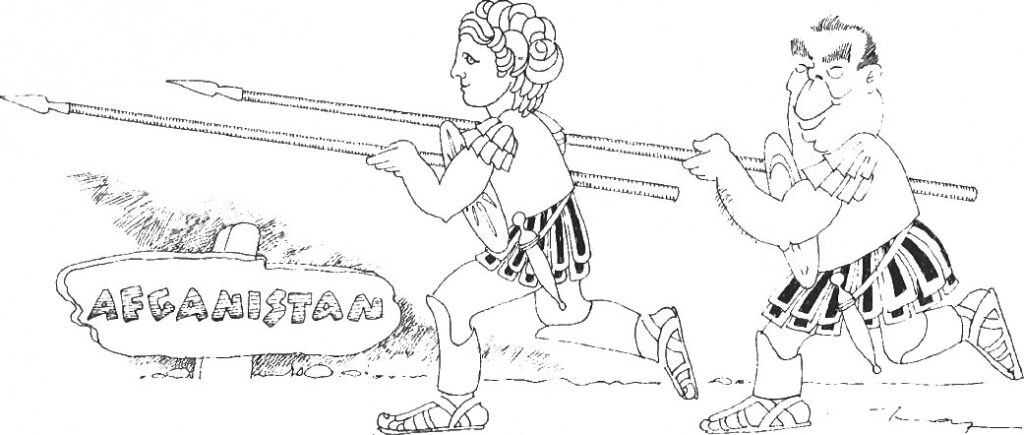
There was a coach parked nearby with the name of a Russian cruise ship on it and a group of people was straggling from the museum, some getting into the coach and taking their seats and others going up to the bar counter and ordering a Coke or a lemonade-Russian tourists, I thought to myself. What a splendid opportunity to find out what they thought of the exhibition. I don’t speak Russian but surely some of them must know some English or French, ί went up to a likely looking prospect — a tall blond man with high cheekbones and pale blue eyes who had a Zenit camera slung round his shoulder and a plump little woman hanging on his arm.

“Excuse me, sir. Do you speak English? Parlez-vous francais?” I asked.
He looked at me with a slightly bewildered expression. Then he smiled broadly and shook his head. “Nyet,” he said, and turned away from me to pick up his drinks on the counter.
By the time I had approached several other Soviet citizens in a similar manner and been met with “Nyets” all round, I had obviously become a cause for concern to the person in charge of the group who came tumbling out of the coach and approached me with a worried look on his face.
He was a bulky man with thick eyebrows, beady blue eyes and a shock of black hair. He looked very much like the late Oscar Homolka and, like that great actor, spoke English with a heavy accent.
“Can I help you?” he asked very politely but with an expression on his face that said: “Don’t you know our people aren’t supposed to make contacts with locals and you’d better stop pestering them or else.”
However, I took his question at face value and said: “Yes, you can. I’d like to know what you people thought of the exhibition you have just seen. Were you impressed by it?”
“You are with the government?” he asked.
“No,” I replied.
“You are with the museum?”
“No,” I admitted.
“Then why do you want to know?”
“Just like that,” I said, “I’d like to know what a Soviet citizen thinks of the theme of this exhibition which is to remind the modern world that Alexander’s achievements laid the groundwork for the unification of the ancient world through Greek culture, the subsequent growth of the Roman Empire, and finally the spread of Christianity, as President Karamanlis so aptly put it in his inaugural speech at the opening of the exhibition.”
He thought for a while and then he looked up at me and asked: “When Alexander embarked on his expedition to Asia, did he have all those things in mind or was he merely trying to secure Greece’s borders and the colonies in Asia Minor from further attacks by the Persians?”
“I suppose that was his original objective,” I admitted.
“And having defeated the Persians, was there any need for him to attack the peace-loving peoples who inhabited the area that is present-day Afghanistan?”
“I don’t really know,” I replied. “But I suppose he had to consolidate his position.”
“And did he not kill many people in the process?”
“I suppose he did,” I said, feeling rather uncomfortable. I didn’t like the turn this conversation was taking.
“And tell me another thing,” Oscar Homolka went on, fixing me with his beady blue eyes, “did anyone boycott the Olympic Games during the years of Alexander’s campaign?”
“I – I – er, I really don’t know. I don’t think there is any record of that.”
“No,” Oscar Homolka grunted, “people had more sense in those days.”
“And another thing,” he went on, “if the spread of one particular culture throughout the world in Alexander’s day was a good thing, would it not be a good thing today if one culture prevailed and brought peace to the world in the same way as the Pax Romana, for instance?”
“Yes,” I said, “it would be a good thing, but whose culture exactly did you have in mind?”
“Why Marxist culture, of course. Can’t you see how much ground it has gained since the October revolution? The whole of Eastern Europe, Southeast Asia, Cuba, Ethiopia, Angola and other parts of Africa, South Yemen, Afghanistan, Iran fairly soon, and so on.”
“Yes,” I said bitterly, “and how has it prevailed? Purely by the force of arms.”
“And how did Alexander prevail, may I ask?” Oscar Homolka inquired, baring his yellow teeth in a wry grin.
“This is ridiculous,” I exclaimed, getting impatient with him, “You can’t draw parallels like that. Marxism has proved its failure time and time again and you can’t compare Hellenic expansionism 2,300 years ago with communist expansionism today. I’ll admit it’s made some gains, but it can’t go on making them.”
Oscar Homolka fixed me with his beady eyes again.
“And who’s going to stop us,” he asked blandly, “Ronald Reagan?”







